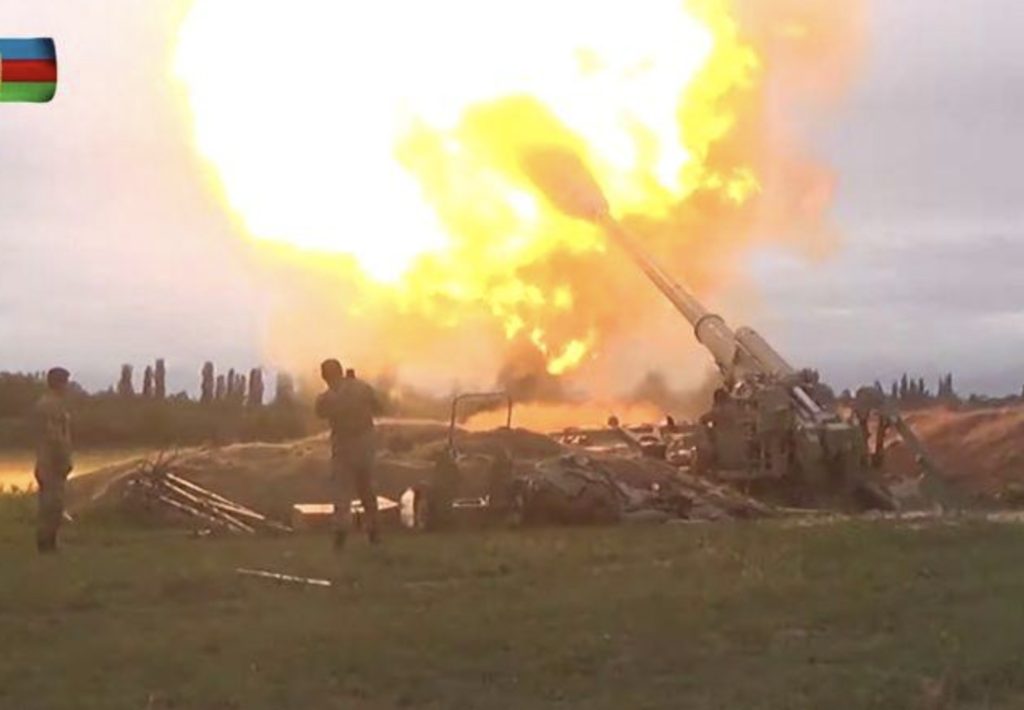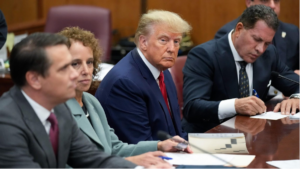
The region of Nagorno-Karabakh (called Artsakh by Armenians) has been hotly contested between Armenia and Azerbaijan since the end of World War I. With the dissolution of the Ottoman Empire, three states were created – the Republic of Armenia, the Azerbaijan Democratic Republic, and the Democratic Republic of Georgia. After ethnic Armenians took arms against the Azeri leadership in Karabakh, war broke out between the two states. Over a century after this first clash, conflict over the same disputed region is once again heating up.
The most recent time Armenia and Azerbaijan have engaged in a direct war with each other was the Nagorno-Karabakh War. Starting with guerilla warfare in the late 1980s as Soviet power declined, and escalating into a full-scale war following the complete dissolution of the U.S.S.R., the war resulted in approximately 25,000 dead, 700,000 Azeri refugees, and 235,000 Armenian refugees. Following the Russian-brokered ceasefire in 1994, Nagorno-Karabakh has been occupied predominantly by the unrecognized Republic of Artsakh—a de facto Armenian occupation, given extremely close relations between Artsakh and Armenia.
Occasional flare-ups were common, the bloodiest up until now being in 2016, which left dozens dead. Earlier this year, in July, more flare-ups left at least 16 dead along the border. It ended inconclusively, with Prime Minister Nikol Pashinyan of Armenia and President Ilham Aliyev of Azerbaijan both claiming victory in separate statements. Now, with the benefit of hindsight, these clashes in July can be seen as a grim warning for what would come.
Both sides claim that the other began hostilities on September 27, and fighting is still ongoing as of October 2. Due to the constantly evolving situation, exact casualties thus far are unclear. However, what is very clear is that this is the deadliest engagement since the 1994 ceasefire. With both sides refusing to enter negotiations despite calls from the UN Security Council, Germany, India, and nearly two dozen other countries to end hostilities, the casualty toll will only increase.
Even more worrisome than the steadfast determination of both Armenia and Azerbaijan to prosecute the war is the possibility of its devolvement into a proxy conflict. Turkey clearly backs Azerbaijan, with President Erdoğan calling Armenia the “biggest threat” to the region, Turkey allegedly dispatching Syrian proxies to assist Azerbaijan, and Armenia alleging that a Turkish fighter shot down one of their warplanes over Armenia’s airspace.
On the other hand, while Russia is ostensibly neutral and sells arms to both parties, Armenia is a member of the Russian-led Collective Security Treaty Organization (CSTO.) Armenia had planned to participate in the most recent Russian-led war-games, and Russia operates a military base in Armenia.
In previous flare-ups around Nagorno-Karabakh, demands from Moscow to come to the negotiating table have often ended hostilities. But with Turkey’s intervention upsetting the balance of power, the two states have thus far refused to negotiate. For Azerbaijan, they now have the backing of the powerful Turkish state to attempt and seize the territory it has long sought after. For Armenia, this is seen as an existential threat, with memories of the Armenian genocide and subsequent Turkish denial of it undoubtedly in the forefront of many minds. And, with Russia having a recent history of both alleged and explicit interventions to protect allies, it is highly unlikely that Moscow will avoid intervention if it feels its interests are threatened.
For the most recent and deadly example of how harmful a proxy war can be, one only has to look at Syria. With Russia, Turkey, and NATO countries supporting, arming, and assisting various factions in the conflict, the Syrian Civil War has killed anywhere from 384,000 to 586,000 people, and displaced over 5.5 million civilians. Nations should see the tragedy in Syria as an ominous representation of what can happen should this indeed dissolve into a proxy war.
On October 1, in an encouraging act of unity, the three heads (France, United States, and Russia) of the Minsk Group, the chief organization attempting to moderate a peaceful solution to the conflict surrounding Nagorno-Karabakh, jointly called for a cessation to hostilities. But as expected, President Erdoğan dismissed these calls, and with Turkey’s refusal to back down, the conflict continues as it was.
The key to ending hostilities is clearly to get Turkey to back calls for peace or, at the very least, stop its outright support of Azerbaijan. If Azerbaijan loses it’s main foreign backer in Turkey, the situation for them may seem less tenable. And for Armenia, if its much larger neighbor returns to a less blatantly aggressive stance in the war, then perhaps this clash may no longer be considered existential in nature.
Pictured: President Trump and President Erdoğan shake hands at a D.C. meeting in 2019. Photo courtesy of Bloomberg.
In order for Turkey to back down, however, the United States will undoubtedly have to get involved in some degree. On occasion, the Trump Administration has been willing to apply pressure on Erdoğan via sanctions, but Trump also recently abandoned America’s long-time Kurdish allies after a phone call with Erdoğan, resulting in the Kurds suffering horrendous war crimes and human rights abuses at Turkish hands.
With everything still very much ongoing, we await what else the U.S., France, Russia, and other major NATO powers will do in response to Turkey’s continued refusal to back talks. But, if Erdoğan continues to foray further into the conflict, then the likelihood of talks occurring will decrease dramatically, while the casualty count will continue to rise. For a chance of avoiding these casualties, the United States needs to immediately begin applying hard and effective pressure on Erdoğan.



